- Home
- Value Creation
- Social & Relationship Capital
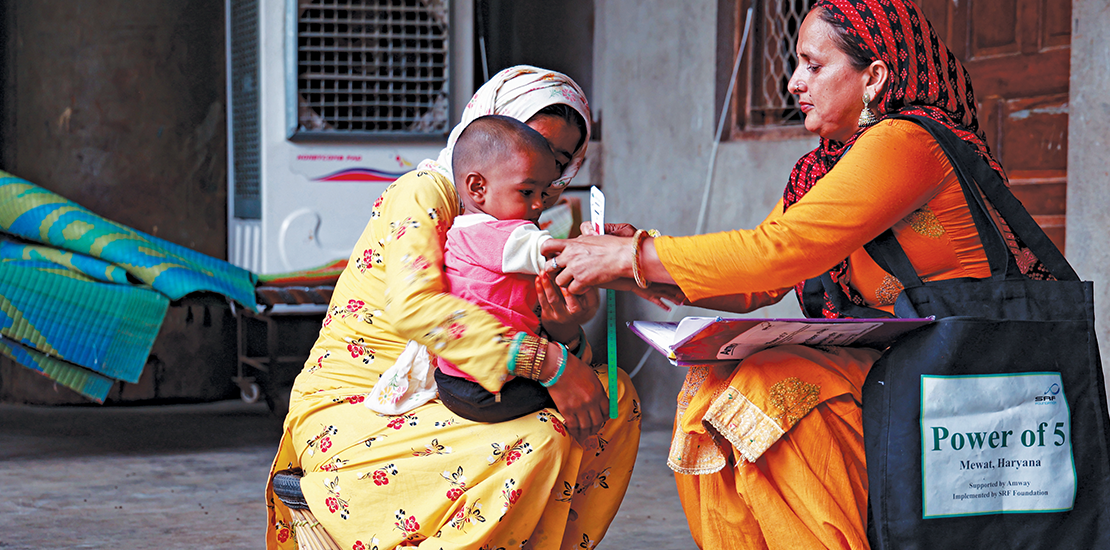
Social & Relationship Capital
Our inclusive approach to business operations has strengthened our stakeholder relationships while reinforcing our efforts for environmental protection and value-added performance.
Material Issues Impacted
Employment

Local Communities

Occupational Health & Safety
Inputs
- Community investment of ₹ 21 Cr.
- Healthy relationship with customers, suppliers and other stakeholders, supported by continuous engagement and long-term relationship with stakeholders
Outputs
- Total CSR beneficiaries 211,782
- Stakeholder recognition and satisfaction
(Business Responsibility Report: Principle 8, Click here )
SRF has made sincere efforts toward building strong and thriving relationships with all relevant stakeholders. These include customers, suppliers, local communities, etc. The Company has been consciously pursuing the agenda of empowering stakeholders to create sustainable value for all.
Besides building sustainable social capital, the Company has taken adequate measures to ensure that its operations do not have any impact on the environment or the ecosystems where our units operate.
Transforming Lives in Local Communities
At SRF, we believe in inclusive growth for all. We have committed ourselves to transforming the lives of local communities through meaningful initiatives, especially for the upliftment of disadvantaged and marginalised sections of society. Towards this end, we ensure continuous monitoring and improvements in our CSR initiatives so we can adequately address the emerging needs of the local communities and create shared value for all. The focus of such initiatives are to provide Quality Education, Empower Youths though Vocational Sill Development, Art and Culture promotions, Healthcare, Natural Resource Management and Disaster Management.
The SRF Foundation oversees all of our CSR activities in India, including one of our largest community programs. Before implementing any CSR project, we conduct a needs assessment of the local communities around our operating units through a dialogue with them. This exercise provides us with useful insights about the prevailing issues, needs and aspirations of the communities as well as their apprehensions regarding the project, if any. It also enables us in seeking the necessary community support for the efficient and timely implementation of the project. The CSR team collaborates with Government, NGOs and local community members in implementing the necessary interventions. We also encourage our employees to volunteer for social activities at all our plant locations under the aegis of our CSR Council.
(Business Responsibility Report: Principle 8, Click here )
The local communities are vested with full responsibility and ownership of the programs, post their completion by SRF. This enables successful adoption and sustenance of these CSR programs. It also enables capacity building of local communities. We monitor the outcomes and milestones of our programs and carry out independent impact assessments at regular intervals. We recently conducted the social impact assessment for our ongoing CSR programs at Mewat district in Haryana and Bharuch district in Gujarat.
The contribution by SRF Foundation has been recognised by several agencies of the Government of India. The Foundation has received prominent awards such as the National CSR Award in Challenging Circumstance by Government of India, Best Corporate Foundation in Education Category by CSR Times and ICSI CSR Excellence Award by Institute of Company Secretaries of India.
(Business Responsibility Report: Principle 8, Click here )
Water Treatment Plant at Delhi Golf Club
SRF provided financial support to Delhi Golf Club in developing “Bio STP Technology”. This technology involves extracting sewage water up to 3 MLD from NDMC pipeline running through the Golf Course and processing it to obtain irrigable water.
The salient advantages of this technology are as follows:
DGC will have adequate water throughout the year to maintain the two golf courses and its associated facilities
The treatment technology is proven
The method is efficient and cost effective
The process is environment-friendly and safe
Wow on Wheels (WoW)
‘HP WoW’ vehicle is a 20-seater computer and IT-enabled vehicle powered by green energy and backed by numerous software suites and cloud integration. This program is implemented by SRF Foundation as a mobile solution to help bridge the digital divide between urban and rural areas. This is achieved by bringing easy information technology access to the isolated and disadvantaged groups. It promotes IT enabled education through e-learning modules and basic computer literacy courses for children living in the rural areas. With added services of Common Service Centre (CSC), it benefits the local population by providing a hassle-free access to Government programs and initiatives.
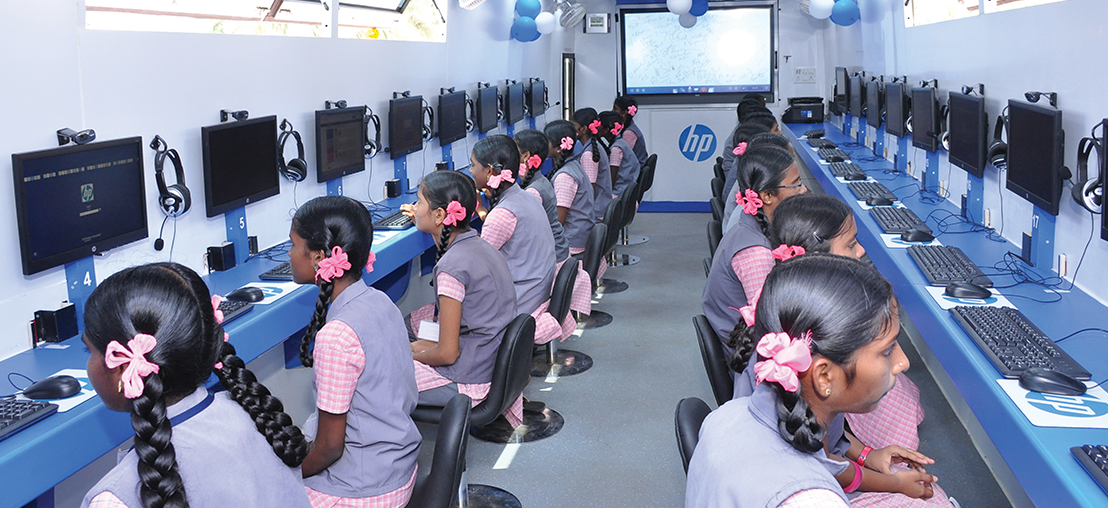

Rural Education Program
Under the Rural Education Program, SRF Foundation is working towards upgradation of infrastructure in Government schools. These schools are transformed into ‘Model Schools’ by providing them with upgraded physical infrastructure along with digital tools. Some of the upgrades include - improved sanitation facilities, access to clean drinking water, technology application, mobile science education, sports and games promotion, construction of well-equipped libraries and science labs, BaLA (Building as learning aid) paintings etc.
Apart from the physical transformation of schools, the SRF Foundation imparts leadership and curriculum training to teachers and the School Management Committees (SMCs). The Foundation works closely with them to raise the quality of teaching and create the best possible learning environment in these schools.
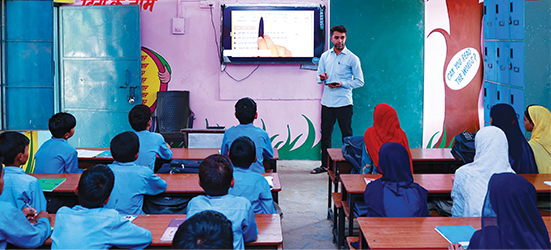

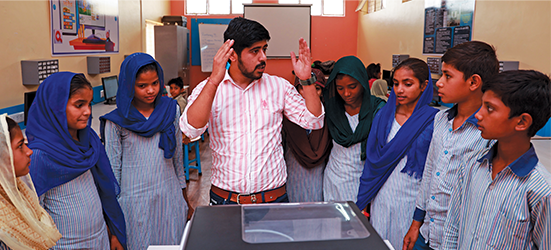
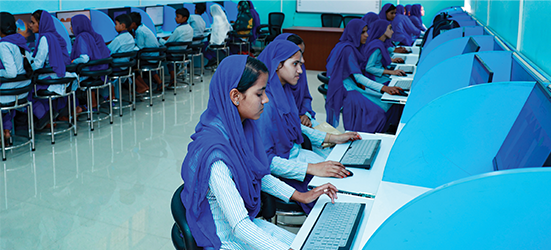
Flood Relief – Bhind, Madhya Pradesh
The SRF Foundation worked relentlessly to support the flood-affected Mehgaon, Raun, and Amayan Tehsils of Bhind district and its adjoining areas when heavy rains ravaged the Bhind District of Madhya Pradesh. When constant rain brought life to a halt and caused widespread damage, SRF Foundation mobilised its team and distributed relief kits to provide immediate sustenance to the affected families. As a part of Corporate Social Responsibility, the SRF Foundation distributed 500 packets of food, which consisted of 17 items worth ₹ 7,27,483, along with clothes and other possible help for flood relief under Disaster Management. SRFF’s prompt response and goodwill was welcomed as well, for which SRFF was awarded a token of appreciation by the Commissioner of Chambal Division, Shri Ashish Saxena (IAS) himself.
Flood Relief – Manali, Tamil Nadu
Severe rain in Manali, Tamil Nadu in 2021 adversely impacted the lives of thousands of people. SRF Foundation contributed in the process of helping out the Tamil Nadu Rescue Force, consisting of police officers, by providing them with 40 pairs of gum boots, so that their safety remains assured while aiding others. The Foundation also did its part for the community by arranging for 200 bedsheets, 100 pillows and 32 bed covers for the disaster-struck people. The provision of food was also done, for both the policemen and the people in affected communities.
Flood Relief – Gummidipoondi, Tamil Nadu
Heavy rains pounded Tamil Nadu’s Thiruvallur district, dumping over 1,000 mm of rain in just four weeks, and they wreaked havoc on people’s lives and property. The disaster was of such a magnitude that the Revenue Officers - Tahsildar and Revenue Inspector of Gummidipoondi approached SRF Foundation to assist in the recovery efforts of the affected people in and around the Gummidipoondi area of Thiruvallur. The Foundation also ensured the delivery of 101,038 in sponsored essential provisional items such as rice, dal, oil, and food to the 500 flood-affected families.
101,038
Sponsored essential provisional items
COVID-19 Response
SRFF organised several vaccination camps for COVID-19 that have managed to reach 115 local communities in the country in the year 2021-22. This camp was organised in collaboration with Sharda Hospitals to reach places where reach of vaccines through conventional methods was difficult and where there was heightened fear and distrust of the vaccine among the people. Overall, pan-India SRF Foundation’s noble actions impacted 15,000 people through vaccination drives.
During the second wave, the Foundation also provided oxygen support to severely-affected areas and impacted 1,000 beneficiaries through oxygen concentrators and 200 people through oxygen plants. Additionally, also provided essential anti-COVID equipment such as masks and sanitisers to the students at Government High School, Manali to help them battle this dangerous virus. These recipients of these goods in the school included more than 30 Teachers and 500 students.
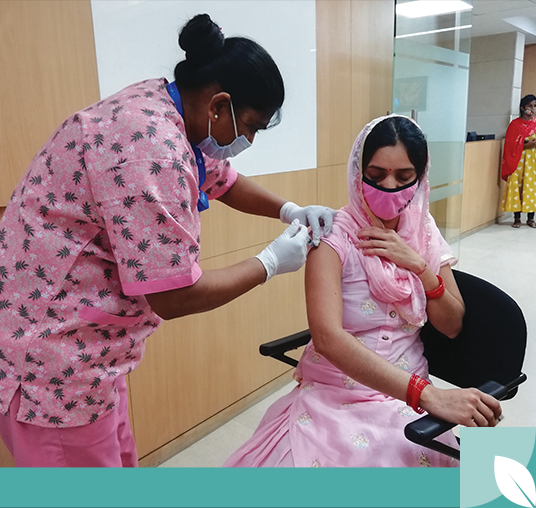
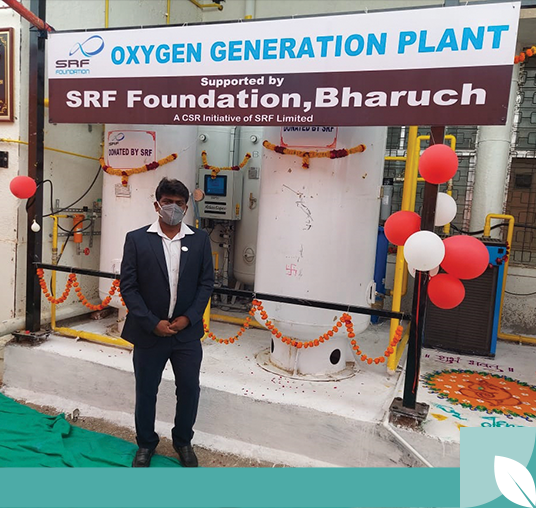
15,000 people
Benefited through vaccination drive
Vocational Skills
Basic Electrician Training Program
SRF Foundation offers skill training in basic electrician trade through 13 centres across country. The trainees are from the poorer parts of rural society. A total of 401 people were trained in basic electrician training programme in 2021-22, with more than 60% of them being placed.
Spoken English Training Program
The teach India is a spoken English Program being run by SRF Foundation since 2010 in Nuh Block of district Nuh (Mewat) aims to build proficiency in the spoken aspect of the English Language. The students completing the course can seek good job in various MNCs in the service sector such as Retail Chains, Food outlets, call centers, schools, NGOs etc. and can easily earn about ₹ 8-12 k per month. Last year, 249 students successfully completed the Spoken English Language course.
Basic Computer Literacy Program
In 2017, SRF Foundation launched the Basic Computer Training Program aiming to provide knowledge and the required skill set to the youth of Nuh, Mewat, Haryana under its Rural Vocational Skills Program (RVSP). This is a three-month-long program which is free of cost for the students. During the course, students learn about MS Word, MS Excel, MS PowerPoint, and the internet. They also learn about personality development through personality development classes. During the financial year of 2020- ‘21, the program successfully mobilised 247 students in 4 batches. All 247 students completed the course.
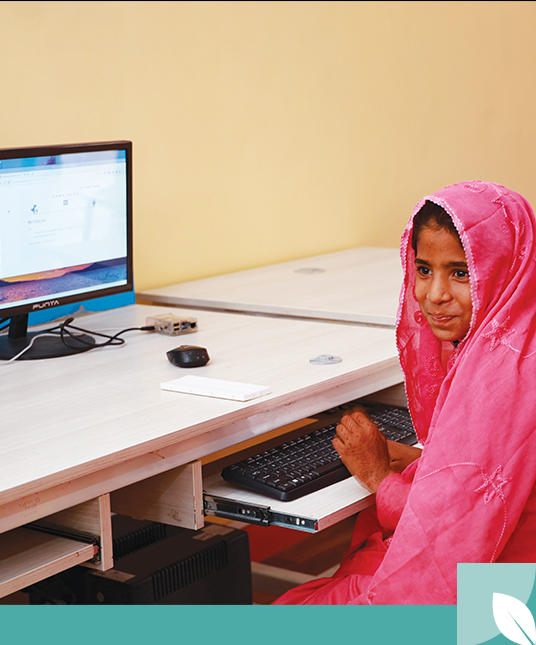


401 people
were trained in basic electrician training
programme in 2021-22
Partnering with Customers in their Growth Journey
SRF engages with its customers in diverse and meaningful ways to build sustainable and trust-based partnership with them. The Company seeks customer feedback through periodic customer satisfaction surveys. We utilise robust resolution mechanisms to ensure that customer feedback is incorporated on a regular basis, and corrective measures are taken promptly.
As on 31st March 2022, 5% of the total complaints received during the financial year were pending for resolution.
(Business Responsibility Report: Principle 9, Click here )
Product Labelling
To maintain transparency in terms of information disclosure, SRF ensures that all important and relevant information about the product is disclosed in the labels. This includes instructions pertaining to usage of the product, product grade, dimensions, gross weight, and any other applicable regulatory requirements. Other details such as material factsheet, safety instructions, Zero ODS, information related to handling of product, hazard class (for hazardous materials), or any other special information requested by the customer is also disclosed in the labels.
In addition to the required state and national laws, our Chemicals business comply with all applicable international rules and regulations, such as the e Globally Harmonised System (GHS), Classification, Labelling and Packaging (CLP) notification, International Maritime Dangerous Goods (IMDG) Code, etc.
(Business Responsibility Report: Principle 9, Click here )
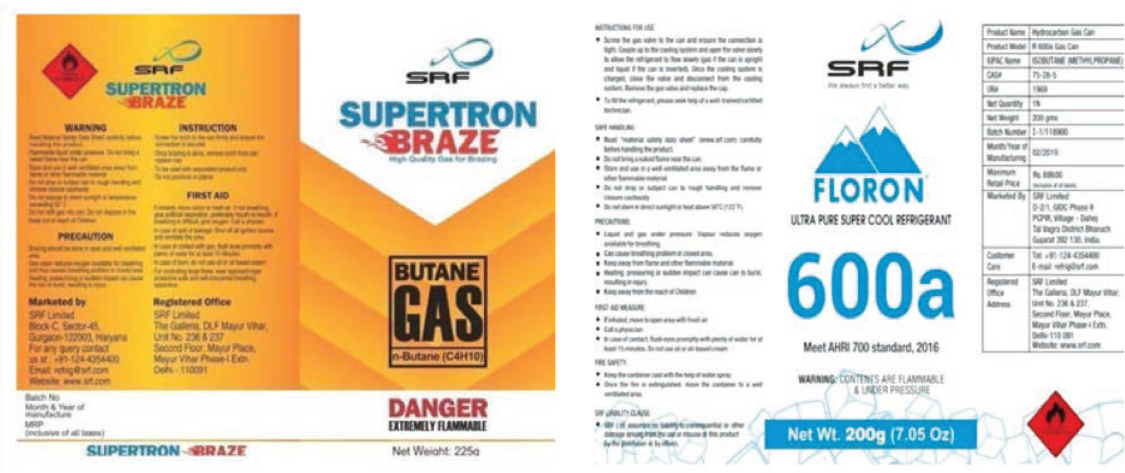
Sustainable Product Offerings
We believe that the key to building a sustainable business is to offer products that are sustainable, affordable and accessible to all. Toward this end, SRF has been consciously pursuing the development of sustainable products by investment in design thinking, disruptive innovation and new technology deployment.
Some of the key products are highlighted below:
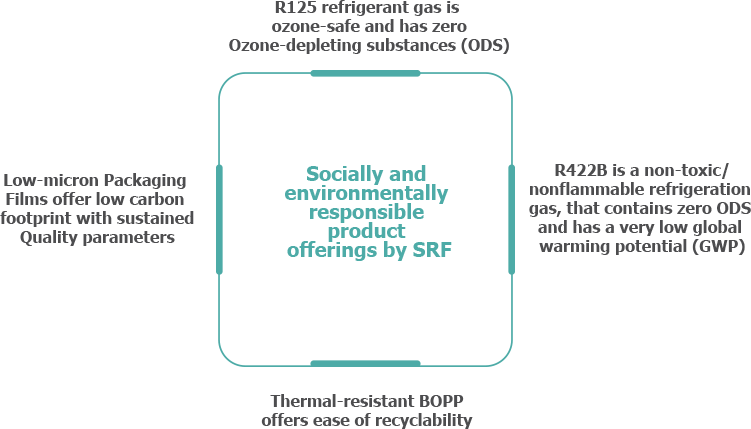
(Business Responsibility Report: Principle 2, Click here )
Sustainable Supply Chain
SRF constantly works towards nurturing sustainable relationships with its supply chain partners by building trust, fair treatment, and transparency in all procurement-related decisions. We have made consistent effort to work with suppliers who are ethical and believe in sustainable development. We are also taking steps to improve the environmental footprint of our supply chain. As part of our ongoing drive to optimise natural resource management, we are now integrating recycled raw materials in our business operations.
We procure a wide range of raw materials and other products from various suppliers. We prefer sourcing locally from farmers and manufacturers wherever possible to support the local economy. We also encourage our contractors to hire workers from neighbouring towns and villages. Our chemical plant in Bhiwadi procures mustard husk from small farmers in Haryana and Rajasthan.
Our Company incorporates ESG aspects related to health and safety, human rights, labour laws, environment, etc. within the supplier agreements. We follow a Code of Conduct for assessing the ESG performance of our suppliers. A self-assessment exercise in accordance with the SA-8000 standard is carried out for the suppliers and vendors. Additionally, SRF also undertakes the ‘Supplier Quality System’ assessment by evaluating them on various parameters like resource management, compliance with environmental requirements and certifications, customer complaint handling, storage etc. The Company follows a structured process which includes identification of gaps implementation of corrective action plans to address these in a timely manner. Based on the outcome of this assessment, rating is also provided to key suppliers. SRF conducts awareness meetings on procurement procedures and requirements with the suppliers on a regular basis to align them with the Company’s expectations regarding sustainability and product quality.
(Business Responsibility Report: Principle 2, Click here )
In order to improve efficiency and optimisation levels across supply chain, SRF is in the process of automating its supply chain. All manual processes, such as supply chain mapping for raw material, have been digitised. The system generates production batches automatically, thereby eliminating manual intervention and improving the overall efficiency of the system. In some key segments, SRF also plans to integrate the customer and supplier portals to gain quick access to information on key supply chain metrics.